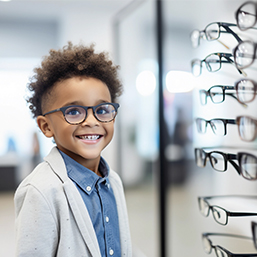
We live in a world where screens dominate our daily lives. From smartphones to computers, our eyes are constantly engaged with digital devices. While these technologies have undoubtedly made our lives more convenient, they have also contributed to a concerning trend – the increasing prevalence of myopia, or nearsightedness.
Myopia is a common vision condition characterized by the ability to see objects up close clearly, while distant objects appear blurry. It occurs when the eyeball grows too long or the focusing power of the eye is too strong, causing light to focus in front of the retina rather than directly on it. Myopia typically develops during childhood and can worsen over time, leading to increasingly severe nearsightedness.
Over the past few decades, myopia has reached epidemic proportions, particularly in urban areas with high screen time and limited outdoor activities. According to the World Health Organization, nearly 30 percent of the global population was myopic in 2020, and this number is projected to rise to 50 percent by 2050. This alarming trend calls for urgent attention and action.
Myopia isn't just an inconvenience; it can have serious consequences for eye health. Increased myopia is associated with a higher risk of sight-threatening conditions such as cataracts, glaucoma, retinal detachment, and myopic macular degeneration. Therefore, controlling myopia progression is crucial to reducing these risks and preserving long-term eye health.
Myopia control is a revolutionary approach to managing nearsightedness. Unlike traditional eyeglasses or contact lenses, myopia control strategies aim to slow down the progression of myopia in children and teenagers, while simultaneously correcting the vision. This can include the use of low dose atropine eye drops, specialty lenses in glasses, myopia control soft contact lenses, or retainer lenses also known as orthokeratology lenses.
Eye examinations are a vital part of preventive healthcare. Alberta Health Care covers a portion of an annual eye exam for all children, until they turn 19. Approximately 80 percent of all learning occurs through the visual pathways, and vision problems can inhibit a child from performing to their maximum potential.
Regular visits to your eye care professional can:
Establishing a healthy environment at home is equally as important in order to help manage myopia. Evidence suggests that spending more time outdoors and getting adequate sleep are protective against myopia. Encourage two hours of outdoor time a day for children, weather permitting. Adequate sleep is also crucial to the health of a developing child. Turn off screens one hour prior to bedtime and ensure your child gets the recommended hours of sleep for their age group. Typically, school-age children need nine to 11 hours of sleep per night.
The Canadian Pediatric Society recommends these guidelines to manage screen time effectively:
In an age where screens are omnipresent, myopia control and regular eye examinations for children are more critical than ever. Myopia's increasing prevalence demands our attention, but by taking proactive steps, we can protect our vision and that of future generations.
Dr. Jessica Yang is an optometrist practicing at Eyedeology, located at the Rockyview Health Center Building #1 in Calgary. She has a special interest in myopia management, dry eye disease, and specialty contact lenses. For more information on myopia and eye health, visit eyedeology.ca. Dr. Yang is currently accepting new patients of all ages. Email This email address is being protected from spambots. You need JavaScript enabled to view it. or call 587-353-5061 for availability.
See our related articles:
Calgary’s Child Magazine © 2024 Calgary’s Child